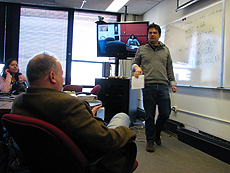LHC Physics Center switches to whiteboard-only forums
 |
John Paul Chou (right), physics professor at Rutgers University, answers questions during the LPC physics forum at Fermilab. The forum began in 2006. Photo: Amanda Solliday
|
For attendees at Fermilab's LHC Physics Center forum, PowerPoint slides are a thing of the past.
The forum organizers made a switch from slides to chalkboard-style talks about six months ago. This is part of a larger effort by the LPC to shift the biweekly meetings from monologue to dialogue.
"Without slides, the forum participants go further off-script, with more interaction and curiosity," said Andrew Askew, an assistant professor of physics at Florida State University and a co-organizer of the LPC physics forum. "We wanted to draw out the importance of the audience."
More interaction was exactly what the new leadership of the LHC Physics Center wanted when they approached Askew and Yuri Gershtein, a former LPC distinguished researcher, to think of ways to better engage LHC scientists in the United States. The Large Hadron Collider in Geneva, Switzerland, currently undergoing upgrades, will come back online for a higher-energy run in 2015.
In one of the recent meetings, physics professor John Paul Chou of Rutgers University presented to a full conference room in Wilson Hall. He held a single page of handwritten notes and a marker, while questions and comments from the audience flecked the formal presentation.
It's not meant to be a lecture, but a discussion. An experimental physicist and a theoretical physicist each lead the forum for half of the allotted hour, without electronic assistance.
"We all feel inundated by PowerPoint. With only a whiteboard, you have your ideas and a pen in your hand," Askew said.
PowerPoint gives speakers an easy way to document their presentation so others can readily review the material later. But Elliot Hughes, a Rutgers University doctoral student and a participant in the forum, says a ban on slides has encouraged the physicists to connect with the present audience.
"Frequently, in physics, presenters design slides for people who didn't even listen to the talk in the first place," Hughes said. "In my experience, the best talks could not possibly be fully understood without the speaker."
The LPC is the United States hub for the CMS experiment. CMS is one of the four major experiments at the Large Hadron Collider. Many Fermilab scientists and university researchers across the United States are involved with the project, which is designed primarily to look for hints of new physics. The LPC physics forum serves as platform to discuss ongoing work and future goals of U.S. efforts.
—Amanda Solliday
|